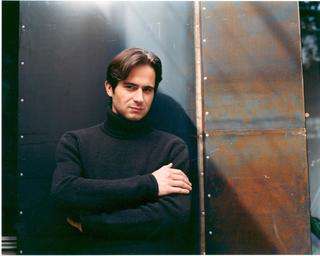|
Back
Dutoit and the Philadelphia Orchestra New York
Isaac Stern Auditorium, Carnegie Hall
04/13/2010 - and April 9, 10, 11 (Philadelphia)
Karol Szymanowski: Symphony No. 4, Op. 60 "Symphonie concertante"
Claude Debussy: La Mer
Igor Stravinsky: Le Sacre du printemps
Piotr Anderszewski (Piano)
The Philadelphia Orchestra, Charles Dutoit (Chief Conductor)

P. Anderszewski (© Sheila Rock/Virgin Classics)
Coincidentally, the span between La Mer and Szymanowski’s Fourth Symphony is about the same span in which Charles Dutoit has been Artistic Director of the Philadelphia Orchestra: 30 years. During that duration, judging from last night’s performance, Mr. Dutoit has somehow turned the clock back. Back to the era of Leopold Stokowski with the same orchestra some 60 years ago.
Nobody ever painted musical colors like Stokowski’s Philadelphia Orchestra. One could question his tempos, his devious finagling with the scores (Tristan ending on a forte??). But Disney was right in choosing Stokowski for Fantasia. He was a Technicolor conductor.
All three works showed those colors last night. Stravinsky’s Rite of Spring was the most scandalously colorful work of the 20th Century, and no conductor, whether a Bernstein or a Boulez would dare have fooled around with its rhythms.
Mr. Dutoit made no great changes, but with his orchestra, he gave the most glittering clarity to the less savage sections. The “Spring Rounds” started off not only with each instrument as a solo, but even in its savagery reverted back to the luscious winds. Yes, he made those drums and low brass frighten us all in Carnegie Hall, but he allowed the flute trills to soar above us.
The second part, always something of a letdown, was here deceivingly melodic at first those Philadelphia strings humming with tensility and suspense. It was the kind of performance which Stravinsky might have said–as he did after hearing Bernstein conduct the work– “Wow!”
La Mer is a Dutoit specialty, and its luminosity was evident here. I once stayed at the beach hotel where Debussy finished the work, in tranquil Eastbourne, and trust me, Debussy’s sea was totally of the imagination. Yet that imagination was covered deftly by Mr. Dutoit’s orchestra, especially again the brass. Not only meticulous with nary an error, but with voices that could rage and soothe, and that lit up the dialogue of wind and sea.
Certainly the most interesting work was the most unfamiliar: Karol Szymanowski’s very late Symphony Number Four a.k.a. Sinfonia Concertante for piano and orchestra.
Piotr Anderszewski, from the composer’s own Poland, was the most persuasive pianist, which was natural. But here was a problem. For, outside of a small cadenza in the first movement, Mr. Anderszewski’s piano was simply part of the very loud, very tuneful orchestra. It wasn’t quite a concerto (though obviously extremely difficult), but was an effective and extremely flashy orchestral work.
This was most unusual for Szymanowski, whose tastes were often quite rarefied. He lived in and delved in mystical Eastern religions, his King Roger (given a half-hearted performance at Bard two summers ago) is exotic and philosophical. His violin concertos are made for any virtuoso.
The Fourth Symphony, unlike the other pieces, gained immediate popularity in the early 1930’s so much so that the composer wondered whether it was “popular trash.” No: it does percolate the excitement of Rachmaninoff and Medtner, its orchestration has the color of Ravel, and the savage intensity of the climax is……well, like most pieces of the time, quite Stravinsky-ish.
The influences are hardly barricades to enjoying the work with all its flash and glitter (and its absolutely stunning flute solos in all three movements). Mr. Anderszewski, whose enthusiastic playing should shine brightly in his next Szymanowski chamber concerts (May 1 and 2 at Carnegie Hall), was not only part of the Philadelphia Orchestra team, but he radiated an already luminosity to an already incandescent composition.
Harry Rolnick
|